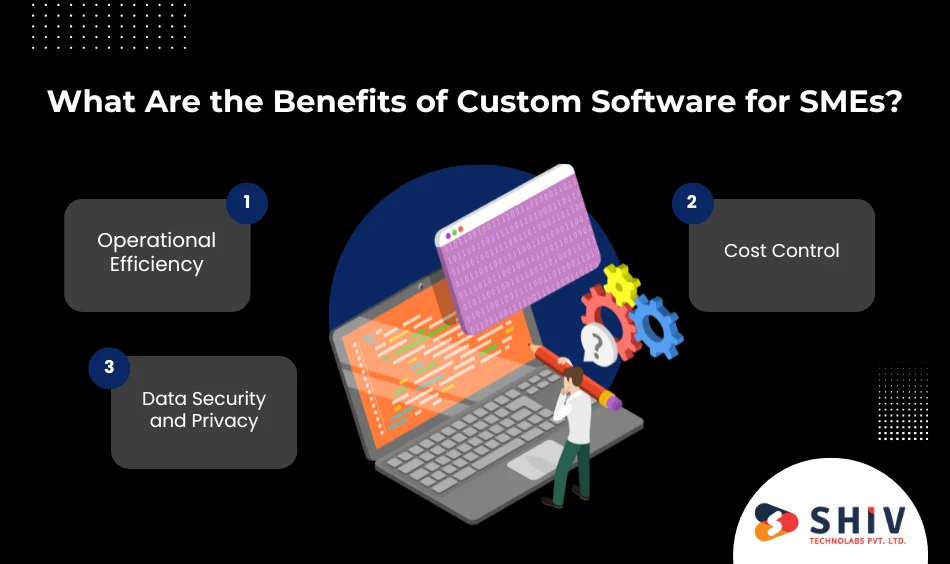Table of Contents
The thriving business ecosystem of Canada has resulted in an unparalleled demand for software development services in Toronto. In many companies, starting from the MaRS Discovery District startups to the established businesses across the GTA, companies are realizing that their processes cannot be efficiently handled by the existing off-the-shelf solutions.
This growing need is observed in the startups seeking to disrupt markets, SMEs that are into process optimization, and corporations that require complex integrations with existing systems. What drives this trend is businesses needing clarity on cost, tech stack choices, and industry-specific use cases that can deliver measurable ROI while maintaining competitive positions in Canada’s dynamic market.
What Factors Shape the Custom Software Cost in Canada?
The significance of custom software cost in Canada can be broken down into multiple factors that directly contribute to project budgets and schedules. The key factors are:
Complexity and size of the project: Financial costs are not the same for web applications that have basic CRUD functionality as compared to an enterprise system that has integrations with other systems, advanced analytics, and real-time processing.
Functionalities and features: Some features will push the costs even higher, such as integrating AI/ML, applying real-time collaborative tools, or complex reporting dashboards.
Third-party integrations: Adding or integrating other solutions, such as payment processing solutions, CRM solutions, or industry-specific tools, increases the development timeline and also introduces potential licensing fees as a cost to develop the integrations.
Compliance Requirements: If you operate in Canada, you need to consider compliance, not just with PIPEDA, but with industry-specific regulations and provincial requirements too. Each compliance requirement can add to the complexity not just of the development project, but also of ongoing maintenance.
Post-Launch Support: This includes ongoing maintenance, updates, security patches, and feature enhancements, which are estimated to consume between 15% – 25% of the initial development cost per year.
Cost Comparison Table
| Project Type | Small Project | Medium Project | Enterprise Project |
|---|---|---|---|
| Budget Range | $15,000 – $50,000 | $50,000 – $200,000 | $200,000+ |
| Timeline | 2-4 months | 4-8 months | 8+ months |
| Toronto Hourly Rate | $80 – $120/hr | $100 – $150/hr | $120 – $200/hr |
| Offshore Average | $25 – $50/hr | $35 – $70/hr | $50 – $100/hr |
| Team Size | 2-4 developers | 4-8 developers | 8+ developers |
How Much Does Custom Software Cost in Toronto?

When enterprises inquire how much custom software costs in Toronto, there is no precise answer to this question, as it can be influenced by multiple local factors that describe the peculiarities of the GTA tech market.
Typically, in the Greater Toronto Area, you can expect to pay anywhere from $80 – $200 per hour on an hourly basis. Experienced developers and specialized roles stand out by charging high rates. These rates are a reflection of the fact that Toronto is an expensive city to live in, has a very competitive talent market, and premium client’s place value on local expertise and communication advantages.
Average project budgets vary significantly by business size and complexity:
MVP for Startups: $25,000 – $75,000
- Basic functionality to validate market fit
- 3-6 month development timeline
- Focus on core user experience
ERP/CRM for SMEs: $75,000 – $300,000
- Integration with existing business processes
- Custom workflows and reporting
- 6-12 month implementation timeline
Enterprise-Grade Solutions: $300,000 – $1,000,000+
- Complex integrations and scalability requirements
- Advanced security and compliance features
- 12+ month development and deployment timeline
Various government support programs can grant relief to eligible businesses. IRAP is a funding mechanism for technology development and SR&ED tax credits, as well as tax deductions, which could give you back 35-68% of your development costs, making custom software more affordable and easier for Canadian businesses.
What Is the Best Tech Stack for Custom Software in Canada?
To get the best stack for custom software in Canada, striking a balance between technical needs, team experience, and long-term maintenance is crucial.
Front-End Technologies:
- React: Perfect for user interfaces that are more complex, as it has a good number of developers available in Toronto.
- Angular: Perfect for business apps with robust structure and TypeScript support.
- Vue.js: Gaining popularity for fast development and a simple framework.
Back-End Frameworks:
- Node.js: It is based on JavaScript, thus one can use the same language both client/server side, which makes it perfect for real-time applications.
- .NET: Microsoft is integrated into its ecosystem, has strong enterprise support, and is preferred in the financial sector.
- Python (Django/Flask): Excellent for data-heavy applications and AI/ML integration
- Java (Spring): Used by large organizations because it offers enterprise scalability and security.
Cloud Platforms:
- AWS: Most comprehensive service offering, strong Canadian presence
- Microsoft Azure: Excellent for businesses already using the Microsoft ecosystem
- Google Cloud Platform: Leading AI/ML services and competitive pricing
Key Factors for Choosing a Tech Stack:
Scalability: Ensure the technologies you choose can support the anticipated growth without the need for major architectural changes.
Security: Select only those frameworks which are having strong security features and community support for vulnerability issues.
Budget & Developer Availability: Consider the local talent pool in Toronto and ongoing development costs.
Industry Compliance: Ensure chosen technologies support required compliance standards (PIPEDA, SOX, HIPAA).
What Are the Benefits of Custom Software for SMEs?

The advantages provided by custom software to small and medium organisations are not confined to automating tasks; rather, they offer strategic advantages that transform operational workflows and competitive position.
Operational Efficiency: Custom software reduces needless manual processes, improves human error, and automates complex workflows that off-the-shelf software cannot.
Cost Control: Although the initial cost might be higher, custom solutions remove recurrent licensing fees, reduce dependency on numerous software vendors, and reduce the need to train employees.
Data Security and Privacy: SMEs are able to introduce industry-appropriate security measures and have full control over their sensitive customer data and business data, which is an important consideration for compliance with PIPEDA.
SME Advantages Include:
Better Workflow Integration
- Seamless connection between departments
- Elimination of data silos
- Real-time information sharing
Less Dependency on Off-the-Shelf Tools
- No feature limitations or unwanted functionality
- Predictable costs without subscription escalation
- Complete control over updates and changes
Tailored Compliance Features
- Canadian tax regulation compliance
- Industry-specific reporting requirements
- Privacy law adherence (PIPEDA, provincial regulations)
Why Do Startups in Toronto Prefer Custom Software?
Demand for software development for startups in Toronto has risen as the city boasts of an entrepreneurial ecosystem and business advantages that are not found elsewhere
MVP Development: Startups can build MVPs that have a specific goal without additional features, which might slow down the process of getting user feedback and market validation.
Investor Readiness: Custom software helps in demonstrating the technical competency and can create defensible intellectual property that appeals to the investors, and this is particularly important in Toronto’s competitive funding environment.
Scalability Foundation: A bespoke architecture intended for a faster user base growth does not require expensive platform migrations that are so typical for the ones startups that use off-the-shelf solutions.
AI and Modern Tech Integration: Toronto is close to the leading AI research centers, which eases things for start-ups looking to integrate advanced technologies such as machine learning, natural language processing, and computer vision into their products.
Local Mentoring Ecosystem: Access to MaRS, Ryerson DMZ, and other incubators provides technical mentoring and network-building opportunities that are essential adjuncts to custom software development.
Startup Benefits:
- Funding Traction: Custom software provides a technical execution capability demonstration to investors
- Lower Pivot Costs: Purpose-built architecture allows easier change of features or business models as compared to architectures that are not purpose-built
- Unique Product Identity: Differentiation that is made through custom user experience and proprietary functionality
How Does ERP Development in Toronto Support Businesses?

ERP development in Toronto is focused on complex operational requirements in a number of sectors by providing integrated solutions that expedite processes and enrich decision-making ability.
By combining accounting, budgeting, and financial reporting with operational data , custom ERP systems offer the ability to get a real-time business performance and control cash flow. Optimization of Human Resources is achieved by integrated HR modules which take care of recruitment, onboarding, performance management, payroll, as well as ensure compliance with Ontario employment standards and federal regulations.
Supply Chain and Inventory Management are the most critical parts in manufacturing and retail businesses. Custom ERP solutions help in fine-tuning inventory levels, automating reordering, procurement processes, and giving overall supply chain visibility.
Industry-specific applications include:
- Manufacturing: Production planning, quality control, equipment maintenance scheduling
- Retail: Multi-channel inventory management, customer analytics, supplier relationship management
- Logistics: Route optimization, fleet management, transportation compliance tracking
Some of the most demanded ERP Modules in Toronto are financial management and accounting, which include customer relationship management (CRM), supply chain management, HR and payroll, business intelligence and reporting, project portfolio management, resource planning, and compliance and risk mitigation.
What Role Does CRM Development in Toronto Play for SMEs and Enterprises?
Recently, many companies have noted a significant competitive advantage that can be achieved by establishing CRM development in Toronto, which is the key business area of GTA, the region where client retention and relationship quality directly impact the levels of growth and profitability.
CRM models deployed for Customer Lifecycle Monitoring help observe the complete customer’ journey – from their first encounter to after-sales services. This enables the delivery of personalized services and proactively manages relationships. AI-powered analytics and automation let sales get better at lead management – by helping them forecast with more precision not only the revenue figures, but also spot more upselling and cross-selling opportunities.
Retention analytics allow defining clients with a high risk of leaving, measuring satisfaction rates, or implementing the strategies that will help to decrease churn and increase life span. Within the diverse business environment of Toronto, CRM solutions provide flexibility to adapt to changing market conditions, regulatory demands, and customer expectations that generic systems cannot match.
CRM Benefits vs. Off-the-Shelf Tools
| Feature | Custom CRM | Off-the-Shelf CRM |
|---|---|---|
| Customization | Unlimited field options | Limited field customization |
| Integration | Seamless with existing systems | May require additional tools |
| Scalability | Built for growth trajectory | Generic scaling limitations |
| Cost (5 years) | Higher initial, lower ongoing | Lower initial, higher ongoing |
| Compliance | Built-in Canadian compliance | Requires configuration |
How Do Toronto Businesses Choose the Right Software Development Partner?
While choosing a development partner, you need to weigh carefully the factors that directly affect the success of the project and long-term business relationships.
The evaluation of portfolio and experience should review previous projects in similar industries, examine the code quality, and assess the complexity of delivered solutions. Seek established partners in Toronto, like Shiv Technolabs, who have already solved problems similar to your business requirements.
Customer reviews posted on independent platforms such as Clutch, Google Reviews, and directories that are industry-specific provide insights into client satisfaction, project management process, and the quality of post-launch support.
Partner Selection Checklist:
- Comprehensive post-launch: This could be bug fixes, security updates, feature enhancements, and ongoing maintenance system.
- Relevant industry experience: They have handled projects of similar complexity, understand the requirements specific to your industry, and have a good past record of implementation.
- Detailed explanation of cost: Hourly rates that are transparent wide and deep scope definition, and fees hidden are not in our vocabulary.
- Flexible Engagement Models: You can choose from various engagement models such as fixed-price projects, time and materials arrangements, and dedicated team options.
Why Toronto Businesses Should Invest in Custom Software
Investing in custom software development in Toronto is not just about implementing a solution for today; it is an investment for future growth and a competitive edge. The combination of low development costs (especially with government incentives), availability of a top-notch technical workforce, and the possibility to develop perfectly aligned business solutions increases the attractiveness of custom software steadily.
Cost considerations from MVP development for startups to enterprise-grade solutions offer flexibility for businesses at every stage. Right technology stack decisions guarantee scalability and maintainability of solutions, as well as sector benefit, helping to achieve that clear ROI, which affects productivity, regulatory compliance, and customer satisfaction.
Canada’s premium position as a tech centre in the North American technology hub, combined with favorable government programs and an industry-friendly business environment, makes Toronto a perfect destination for initiatives in the area of custom software development, which has been identified as one of the key drivers of business transformation and market leadership.
FAQs
What is the average cost of custom software in Toronto?
Small projects range between $15,000-$50,000 medium applications cost between $50,000-$200,000 and enterprise solutions begin from $200,000. Depending on level of expertise and requirements per hour rate varies between $80-$200.
How do Canadian SMEs benefit from custom software?
SMEs gain advantage through improved operational efficiency, lower cost of ownership, improved PIPEDA compliance and integration with other solutions while eliminating the off-the-shelf software limitations.
Which tech stack is best for building secure custom applications in Canada?
Some of the most popular options that ensure security are React/Node.js for full-stack JavaScript development, .NET for enterprise applications that require Microsoft integration and Python for applications with heavy data. All these should be deployed to secure cloud platforms like AWS or Azure with proper encryption and access controls systems.
Is ERP development worth the cost for mid-sized Toronto businesses?
ROI of an ERP development usually comes through automation which subsequently improves a business operation, better financials and reduced manual processes. Typically, the initial investments amount between $75000 and $300000 are returned within 18-24 months as a result of the improved cost structure and decision-making process.
Why do startups in Toronto prefer building custom software instead of off-the-shelf solutions?
Startups in Toronto opt for bespoke software to make the product stand out, to create attractive intellectual property that catches investors’ eye, to be flexible enough for rapid pivots and to finally integrate with the new technologies which are currently available through the AI and tech research ecosystem of the city.
What is the difference between ERP and CRM solutions for Toronto companies?
ERP systems focus on the internal business processes of an organization like finance, inventory and operations management, while CRM systems are in charge of customer relationship management, sales pipeline and marketing activities. Many Toronto businesses implement both systems with integration to get full business process coverage and data consistency across departments.
Connect with Shiv Technolabs to discuss your project needs and get a free consultation on transforming your business operations.





















